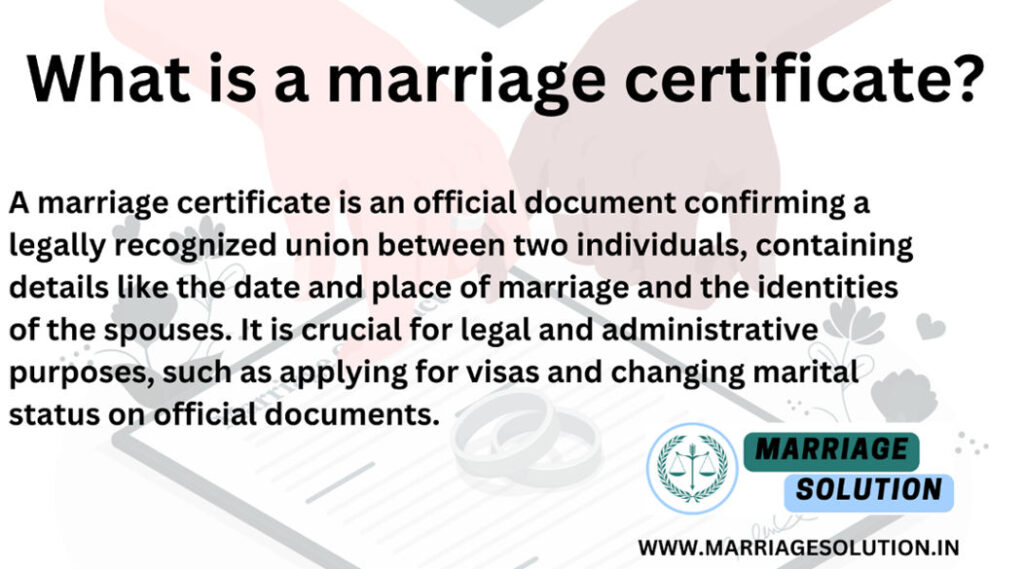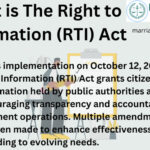- Introduction
- Why is a marriage certificate necessary?
- Who is eligible for a marriage certificate?
- Where can I get a marriage certificate?
- What documents are required for obtaining a marriage certificate?
- Process for court marriage:
- Comparison between court marriage and traditional marriage
- If you require assistance with court or any other marriage.
- Website provided by the Indian government for assistance to women.
Introduction

A marriage certificate is an official document issued by the government that legally validates a marriage between two individuals. It serves as proof of the marriage and establishes the marital relationship between the couple. The certificate typically contains essential details such as the names of the bride and groom, their ages, dates of birth, the date and place of marriage, and the signatures of witnesses and the marriage registrar.

Why is a marriage certificate necessary?
A marriage certificate is essential for several reasons:
1)Legal recognition grants validity and enforceability to the marriage in accordance with the law.
2)Access to Legal Rights and Benefits: Spouses are granted access to an array of legal rights and benefits, including inheritance rights, social security benefits, as well as claims for insurance.
3)For individuals seeking visas or immigration benefits, certain countries may demand a marriage certificate.
4)A name change serves as evidence of marriage when a spouse desires to alter their surname after getting married.
5)If there is a divorce, the marriage certificate becomes essential for legal termination.
Who is eligible for a marriage certificate?
A valid and recognized marriage ceremony is required for an Indian couple to be eligible for a marriage certificate. The bride must have reached the legal age of 18 years, while the groom must have attained 21 years and neither party should already be married to someone else.

Where can I get a marriage certificate?
You can obtain your marriage certificates from either the Registrar of Marriages or the office of the Sub-Divisional Magistrate (SDM) in the district where you got married. In addition to this, certain states in India enable online registration and application for acquiring a certificate via their official websites.
What documents are required for obtaining a marriage certificate?
The required documents may vary slightly depending on the state or region, but generally, the following documents are needed:
- The marriage certificate application form can be obtained either online or at the SDM office.
- b. Evidence substantiating the age and identity of both parties getting married (including documents like Aadhar card, passport, voter ID etc.) is required.
- c. Verification of residency (utility bills, ration card, etc.).
- d. Both parties need to provide passport-sized photographs.
- E. Marriage event announcement or wedding ceremony schedule.
- An affidavit that indicates the marital status, nationality and date of marriage of both individuals.
- If there is a second marriage, proof of the termination of any prior marriages (either through divorce papers or death certificate(s) for previous spouse(s)) must be provided.
Process for court marriage:
For court marriage, follow these general steps:
- Please visit the office of either the SDM or Registrar of Marriages that is closest to you.
- You need to acquire and complete the marriage certificate application form.
- The completed application form should be accompanied by the necessary documents.
- Arrange a meeting for the court wedding ceremony.
- Both parties and witnesses are required to be present in court on the scheduled date.
- Either the SDM or a licensed marriage registrar will oversee the wedding ceremony.
- The marriage certificate will be issued a few days after the wedding ceremony.
Comparison between court marriage and traditional marriage
| Aspect | Court Marriage | Traditional Marriage |
|---|---|---|
| Definition | Legal union between two individuals conducted in court | Customary or religious marriage ceremonies |
| Process | Simple legal procedure | Involves cultural, religious, and social rituals |
| Venue | Typically conducted in a court of law | Can be held in religious institutions, community halls, etc. |
| Requirements | Marriage license, documents, witnesses | Rituals, ceremonies, cultural customs, legal formalities |
| Focus | Legal compliance | Cultural, social, religious customs |
| Emphasis | Legal recognition | Fulfilling cultural and religious obligations |
If you require assistance with court or any other marriage.
Court or any other marriage-related issues, our https://marriagesolution.in/lawyer-help-1/ website may prove helpful. By completing our enquiry form and submitting it online, we can provide customized guidance to navigate through the process effectively. Don’t hesitate to contact us for personalized solutions; we are here to assist you whenever necessary!
What is court marriage?
Court marriage is a legal union between two individuals solemnized by a marriage officer or registrar of the court.
How does court marriage differ from traditional marriage ceremonies?
Court marriage is a civil ceremony performed in a court of law, while traditional marriage ceremonies often involve religious or cultural rituals.
What are the eligibility criteria for court marriage?
Both parties must be of legal marriageable age (usually 18 years for brides and 21 years for grooms) and must not be in an existing valid marriage.
Is there a waiting period for court marriage after giving notice?
The waiting period varies by jurisdiction but is typically 30 days from the date of giving notice of intention to marry.
Is court marriage legally valid in India?
Yes, court marriage is legally valid and recognized under the Special Marriage Act, 1954, and is equivalent to traditional marriage ceremonies.
Which option is more suitable for me, court marriage or traditional marriage?
The choice between court marriage and traditional marriage depends on personal preferences, cultural background, and legal considerations. If you prefer a simple, quick legal union, court marriage may be suitable. However, if cultural and religious customs are important to you, a traditional marriage might be preferable.
- AFSPA Act
 AFSPA act mean Armed Forces Special Powers Act (AFSPA) grants special powers to the Indian Armed Forces in areas classified as “disturbed” due to significant insurgency or internal disturbances.
AFSPA act mean Armed Forces Special Powers Act (AFSPA) grants special powers to the Indian Armed Forces in areas classified as “disturbed” due to significant insurgency or internal disturbances. - Right to Information RTI act :Your Comprehensive Guide (Part 1)
 The Right to Information (RTI) Act : Explore the essence of the Right to Information (RTI) Act through this symbolic image. The image features legal documents, emphasizing the importance of transparency and accountability in governance. The scales of justice represent the balance achieved through the citizens’ right to access information.
The Right to Information (RTI) Act : Explore the essence of the Right to Information (RTI) Act through this symbolic image. The image features legal documents, emphasizing the importance of transparency and accountability in governance. The scales of justice represent the balance achieved through the citizens’ right to access information. - What is Article 371 of Indian Constitution ?Article 371 of the Indian Constitution grants special provisions to specific states and regions within India, addressing their unique historical, social, and cultural circumstances. These provisions aim to accommodate diverse needs and protect cultural identities within the constitutional framework.
- Indian Labour law : Your Comprehensive Guide (Part 1)
 The purpose of labour laws is to safeguard employees and guarantee equitable treatment at the workplace, encompassing aspects such as remuneration, security, and perks. These regulations establish a secure ambiance by imposing minimum wage requirements, ensuring factory safety measures are implemented effectively while granting rights like maternal leave entitlements. Abiding by these principles promulgates an impartial work culture encapsulating upright conduct; thereby cultivating conducive surroundings for progressive development.
The purpose of labour laws is to safeguard employees and guarantee equitable treatment at the workplace, encompassing aspects such as remuneration, security, and perks. These regulations establish a secure ambiance by imposing minimum wage requirements, ensuring factory safety measures are implemented effectively while granting rights like maternal leave entitlements. Abiding by these principles promulgates an impartial work culture encapsulating upright conduct; thereby cultivating conducive surroundings for progressive development. - GST :Your Comprehensive Guide (Part 1 – Understanding the Basics)
 The Goods and Services Tax (GST) is like a big change in how we pay taxes in India. It started on July 1, 2017, and it’s here to simplify things. Before GST, we had many different taxes, and it could get confusing. Now, with GST, it’s like combining all those taxes into one. The idea is to make taxes more straightforward, clear, and fair for everyone. It applies to almost everything we buy or sell, and it’s helping India’s businesses and economy work better together. So, GST is not just a tax change; it’s a step towards making things simpler and better for all of us.
The Goods and Services Tax (GST) is like a big change in how we pay taxes in India. It started on July 1, 2017, and it’s here to simplify things. Before GST, we had many different taxes, and it could get confusing. Now, with GST, it’s like combining all those taxes into one. The idea is to make taxes more straightforward, clear, and fair for everyone. It applies to almost everything we buy or sell, and it’s helping India’s businesses and economy work better together. So, GST is not just a tax change; it’s a step towards making things simpler and better for all of us.
Website provided by the Indian government for assistance to women.
http://www.ncw.nic.in/helplines This official website provides valuable information and resources related to labour laws, policies, and initiatives in India. Visitors can access a wide range of information.
